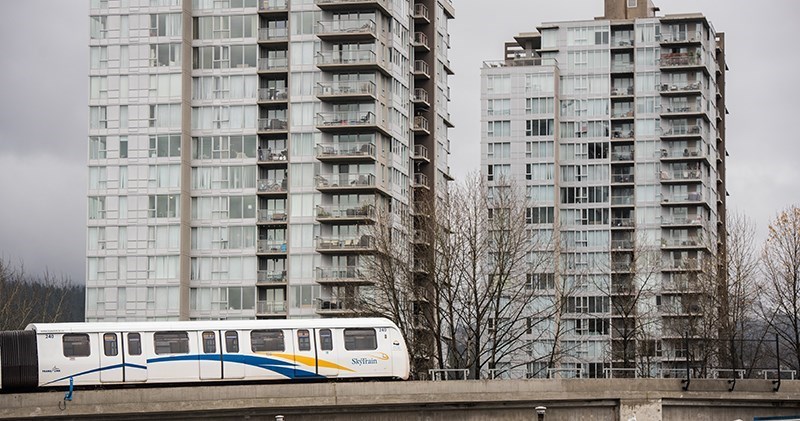Coquitlam city hall is not only back to operating at pre–pandemic levels, but the city’s economy is also soaring with construction in nearly every neighbourhood, the city manager said in his “state of the union” address to council.
And one area that’s about to boom straight up even more is City Centre, where development bids for 50 more towers are under consideration following council’s 2020 approval for the update of the City Centre Area Plan (CCAP).
These include master plans for:
- TriCity Central, across from the Coquitlam Central public transit hub
- Coquitlam Centre mall, which is proposing nine towers
- Coronation Heights, also up to nine high-rises
Peter Steblin’s comments about the city’s overall growth came as council on Monday — following a public hearing — deferred second and third reading to update the density bonus and Community Amenity Contribution (CAC) programs.
Those programs, if approved, would allow increases in fees to offset the cost of major capital projects on the books such as future library branches, recreation centres and parkland improvements that can’t be covered under Development Cost Charges (DCC).
The bill for such projects is estimated to be around $500 million over the next 20 to 25 years to serve the uptick in population, according to a July 5 report from Don Luymes, Coquitlam’s general manager of planning and development.
City staff say the proposed fees, once phased in for developers, will:
- replace the current stepped system with a consistent contribution of 60 per cent of the value of the density bonus, in high-density development projects
- include medium-density apartment projects
- incorporate more rental housing incentives into all zones, where applicable
Luymes told council this month that the financial lift is needed because of the increase in labour and material costs and rising inflation, as well as to reflect expensive land values.
But Mayor Richard Stewart didn’t mince his words. He said the city needs money to pay for the services that residents want and expect from the municipality.
In defence of the proposed density bonus and CAC fee jump for developers, Stewart said “the biggest crisis that we have is housing.
“The need for more housing is enormous. There are families that are desperate for better housing options and one of the ways to do that is through density and the only way to support density is by increasing the amenities near it.”
He added, “Our decision is whether we fund that through the development process or fund it from property taxes paid by everybody.”
Last year, the city’s fees and charges, which include density bonus payments and DCC, brought in $137 million — a massive hike over 2020 because of growth.
FIRST TRIMESTER
Development padded the bottom line for the city and, as a result, “we’re very well positioned to weather any kind of economic storm that comes our way,” Steblin said in his council address, referencing the 2008 global economic downturn.
Coquitlam’s annual report, which came out last month, shows just how cash–rich the city was in 2021, with $55 million more in the pot than in 2020 — again, largely due to massive development and land sale revenues.
According to the first trimester report that came before council last month, Coquitlam added $307 million in construction values from January to April compared with $94 million during the same period last year.
As well, industrial–commercial–institutional (ICI) permits rose eight per cent over the same time frame to $9.3 million, of which 85 per cent was for tenant improvements and additions to existing buildings.
Still, “while there remains a high degree of development interest in the City of Coquitlam, there are some early signs of potential market volatility due to rising interest rates and some potential global economic uncertainty,” said Nikki Caulfield, Coquitlam’s general manager of corporate services, referring to the supply chain backup and the war in Ukraine.
On the rental homes front, Steblin boasted Coquitlam is a regional leader with more than 10,000 market rental and 2,000 below- and non-market rental units under construction or consideration.
As for amenities, he highlighted the two recreation centres that will open this fall — Place Maillardville and the Burquitlam YMCA, and the upcoming Northeast Community Centre — are mostly paid for using developer contributions, partnerships and grants.
“The citizens of Coquitlam are getting significant improvement in services in a wide variety of areas without being tapped in the normal, traditional tax process,” Steblin said.
RECENT APPROVALS
Meanwhile, on Monday night, council unanimously green-lighted the following five development applications for:
- 1200 Cartier Ave.: three-storey seniors rental housing next to Place Maillardville
- 1015 Austin Ave.: 20-storey high-rise by PARC Communities for seniors rentals
- 1155 and 1159 Pipeline Rd. and 1110 Inlet St.: 25-storey residential tower with 206 units by Ledingham McAllister
- 580-600 Harrison Ave. and 581-601 Kelmsley Ave.: three six-storey apartment buildings and a four-storey stacked townhouse building
- 803-807 North Rd. and 603-617 Tyndall St.: 44-storey apartment tower and a six-storey apartment building
After the July 11 public hearing, council also unanimously OK’d second and third readings the following bids for:
- 637-641 Aspen St. and 574 and 582 Foster Ave.: a 49-unit townhouse development by Ciccozzi Architecture
- 1013 and 1025 Brunette Ave.: six-storey apartment building with 166 non-market rental units in the former Vancity building, for Catalyst Community Development Society
- 641-647 Claremont St.: eight-storey building with 110 rental units by Liberty Homes
- 1350 Pollard St.: 50 acres at and around Marigold Elementary for Double Kappa Holdings to prepare two townhouse lots for future development
Citing the unkempt properties at Aspen/Foster, Stewart asked developers to keep their land clean as “some of our neighbourhoods are very fatigued with the amount of development going on.
“It doesn’t help if the site isn’t tidy,” he said.





